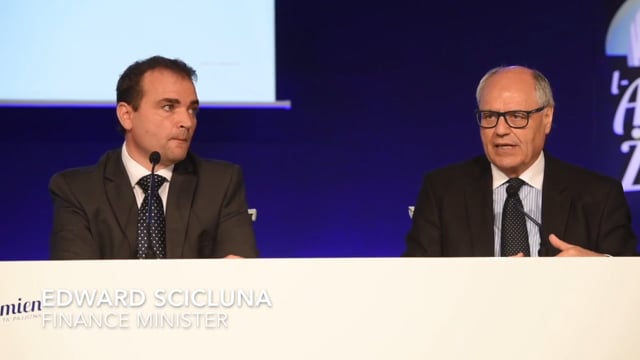[WATCH] Despite election year, government finances still performing well, Labour says
In the first four months of the year, the country registered a surplus greater than that registered last year


Finance minister Edward Scicluna has said that the government has registered a surplus in its consolidated fund during the first four months of the year, indicating that the country’s economic performance was still strong.
“Contrary to past years, when finances slipped during an election year, government finances have continued to improve,” Scicluna said.
He said that between the months of January and April, Malta had registered a €21 million surplus, which was greater than the €9 million registered in the whole of 2016.
“It’s a record that is double what was registered last year. Our finances are still strong and our income is still increasing,” Scicluna said.
He reminded that the country had registered a deficit of €362 million in 2012, which had resulted in the European Commission placing Malta under an excessive deficit procedure.
Since 2012, Scicluna said, the government had progressively reduced the deficit and had finally changed the direction of the government’s finances. Moreover, he said that a number of rating agencies, as well as the European Commission had stated that Malta was expected to continue registering a surplus in the coming years.
He said that an economic plan was decided upon, and a surplus was only made possibly by the fact that the government had no waivered and had kept its economic direction.
Scicluna explained that when compared to the same period in 2016, the government had registered a €100 million increase this year.
He said that capital expenditure had increased by 15%, while recurrent expenditure had increased by 5%. Government revenue increased by 14% - an increase of €22 million from income tax, and increase of €20 million from VAT receipts and an increase of €16 million from social security contributions.
“This is a clear sign that the economy has continued to grow in a strong and steady way,” said Scicluna, who added that evidence of economic performance should not be based on rumours or what people and newspapers say, but on reliable statistics.
Franco Mercieca said that the results reflected the Muscat government’s discipline in running the country.
He said that a surplus had always been the aim of the legislature, and it was unfortunate that the Nationalist Party was now engaging in a damaging campaign against the financial services sector.
“First it was damage to Malta’s reputation now it is the financial services sector, a sector that is of such importance to our country,” Mercieca said.
“If you are hoping to be Prime Minister and you are creating problems for the sector, you are shooting yourself in the foot.”
He said that the fact that increasing the deficit, the government registered a surplus in the year of an election showed that it was putting the country ahead of its desire to remain in power.
Mercieca added that the surplus would allow the government to continue investing in areas such as education and healthcare.
Asked whether the increase in recurrent expenditure was of concern, Scicluna insisted that expenditure was divided into two main categories, that which the government had little control over – such as wages and increases due to collective agreements – and expenditure the government was in a position to control and reduce. He said that a significant portion of the expenditure could be controlled if there was an economic downturn.
The minister was also questioned about his recent meeting with Wolfgang Schauble, the German finance minister, with Scicluna stating that he was very happy that the minister had recently publicly stated that which he had told Scicluna privately.
Stressing that Schauble was a “very influential person”, Scicluna said that he had appeared on German television and defended Malta’s tax system, something he said would help in counteracting what the international media was doing.
Quoting Schauble, Scicluna said that “in Europe there is the principle that every member state decides its own tax regime, something that is the competence of the individual state”.
According to Scicluna, Schauble was speaking on a programme called “Malta – the Pirate’s den”, where he said that there were many European institutions that could investigate any potential wrong-doing, or irregularities in Malta’s tax regime and that “suspecting, criminalising and insulting” other countries should not be anyone’s point of departure.
“Unfortunately, we have gone to the European parliament and criticised our own country and those who had an interest in attacking us have taken cue from this,” he said.
When asked about whether Malta’s economic performance simply reflected what was happening internationally, Scicluna insisted that the last four years were not good for the “European Union” and that Malta had managed not to remain in sync with Europe in this regard.
He said Malta had succeeded in creating supply side economics by helping many join the workforce, and by bringing investment, and therefore more jobs, to the country.
He said that with Europe seemingly starting to find its feet, Malta’s performance was expected to improve further.




.png)

.jpg)
















